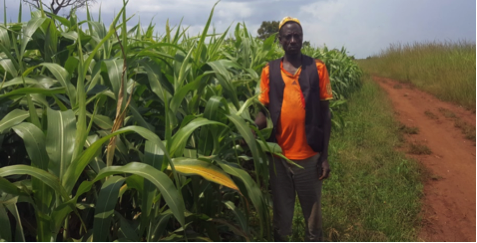There are 278 smallholder farmers in Selama Kebele in the Benishangul-Gumuz Region of western Ethiopia. On average, these farmers own 2 - 10 hectares of land. Smallholder farmer Abdulahi Mohammod, age 48, is one of them. To provide for his thirteen children and two wives, he cultivates 6 hectares of crops which include corn, sorghum, soybean and red peppers. With the earnings derived from his land he is able to meet his family’s basic needs, which includes paying school fees for seven of his children.
There are also 11 agricultural investors in the Kebele such as 61-year-old Abdulmohammod Ibrahim, who grows cash crops such as corn, sorghum and soybean on 250 hectares of land.
Despite the disparity of circumstances among local smallholder farmers and investors in the region, both actors require certain preconditions to fully benefit from their respective farmlands: Abdulahi and Abdulmohammod agree that dispute-free boundaries backed through Land Use Right Certificates are one of the key-prerequisites to be able to sustainably increase their agricultural productivity.
Before commencing agricultural development, investors must lease the land from the regional government which is providing Certified Land Use rights. Meanwhile, the majority of smallholder farmers cultivate land without official land use rights, such as Second Level Land Certification, which means that they suffer from insecure land use rights and tenure insecurity.
For smallholder farmers, land is traditionally passed down from one generation to the next without adhering to any legal transaction procedures. Consequently, overlapping farmland claims are common, as boundary demarcation and confirmation of use rights is only evidenced by word of mouth. This practice is ubiquitous among many sub-Saharan countries where only 10 per cent of the agricultural land is formally documented. These traditional and customary systems do not ensure formal land use rights, and disputes over boundaries and access to natural resources occur frequently. In Benishangul-Gumuz Region, such land disputes were further exacerbated through the government launching of the private agricultural investment project in 2010/11. Even if investors have well documented leases, these are not always strictly adhered to and illegal encroaching on smallholder farmland takes place. Inevitably, this will continue to lead to land disputes until and unless adjacent smallholders can also be provided with legal land use rights.
As insecure land tenure rights prevent long-term investments for both smallholders and investors alike, without formal land use rights, it is challenging to access necessary financing mechanisms such as loans to legally rent plots of land and to ensure legal ownership of the agricultural produce derived from the cultivated land. Hence, land tenure insecurity for smallholder farmers and investors directly translates into insecure livelihoods and inputs for downstream processes.
Solutions to mediate existing land disputes among smallholders and investors and to prevent future disputes are needed urgently. In this regard, the Support to Responsible Agricultural Investments project has been instrumental in addressing these issues. Since 2019, the project funded by the German Federal Ministry for Economic Cooperation and Development (BMZ) has been implemented by the Deutsche Gesellschaft für Internationale Zusammenarbeit (GIZ) in the Region with the aim of ensuring land access and benefits from responsible agricultural investments for smallholders and marginalized people.
To date, approximately 2000 smallholder households have had their land demarcated through the project and are waiting to collect their Second Level Land Certificates from the respective district offices. Abdulahi benefits from this Land Use Right Certificate already.

cultivating sorghum on his land
“My land situation has improved compared to the one my father had. I now have a legal land use right; I do not have to fear boundary disputes with my neighbors; I can rent out my land; I can take out a loan and my children and wives also have inheritance rights.”
Land Use Right Certificates not only resolve and prevent conflicts, but they also serve as the means to boost confidence related to investment decisions. Investor Abdulmohammod believes that secured and documented Land Use Right Certificates make it easier to avert investment risks and mitigate boundary conflicts.

inspecting and monitoring his sorghum field
“My land under cultivation was transferred to me by adhering to a thorough land identification, verification and certification procedure. Hence, claims occurring over the land can be resolved efficiently.”
Quarterly consultation meetings with smallholder farmers such as Abdulahi, investors like Abdulmohammod and government representatives are now organized by the districts and the regional Land Administration and Investment Bureau. The demarcation of land together with the consultations and the dialogue fora have become a gateway for cooperation: knowledge and technology is transferred, smallholders gain better access to certain inputs and investors are confident about investing in the long-term, as adjacent smallholder farmers guard their vast land and assets.
With the Second Level Land Certificate for his six hectares, Abdulahi experienced land tenure security for the first time; he is able to legally cultivate his land without any fear of the land being expropriated. In addition, he generates extra income by renting out land which he does not utilize.
Similarly, Abdulmohammod has gained confidence through community-investor dialogue fora and the support provided by community elders to invest in tree planting and undertaking conservation agriculture. The cooperation with smallholders is beneficial for Abdulmohammod since they protect the investment and are happy to work on his farm.
General

